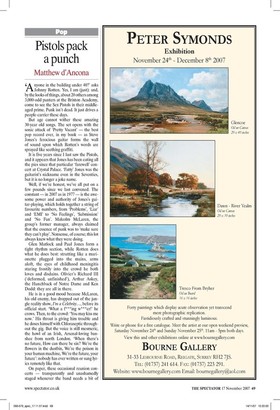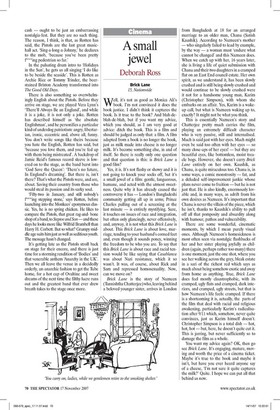Pistols pack a punch
Matthew d'Ancona Anyone in the building under 40?' asks Johnny Rotten. Yes, I am (just): and, by the looks of things, about 20 others among 3,000-odd punters at the Brixton Academy, come to see the Sex Pistols in their middleaged prime. Punk isn't dead. It just drives a people-carrier these days.
But age cannot wither these amazing 30-year old songs. The set opens with the sonic attack of 'Pretty Vacant' — the best pop record ever, in my book — as Steve Jones's ferocious guitar forms the wall of sound upon which Rotten's words are sprayed like seething graffiti.
It is five years since I last saw the Pistols, and it appears that Jones has been eating all the pies since that particular 'farewell' concert at Crystal Palace. 'Fatty' Jones was the guitarist's nickname even in the Seventies, but it is no longer a joke name.
Well, if we're honest, we've all put on a few pounds since we last convened. The constant — in 2007 as in 1977 — is the awesome power and authority of Jones's guitar-playing, which holds together a string of favourite numbers, from 'Problems', 'Liar' and 'EMI' to 'No Feelings', 'Submission' and 'No Fun'. Malcolm McLaren, the group's former manager, always claimed that the essence of punk was to 'make sure they can't play'. Nonsense, of course; this lot always knew what they were doing.
Glen Matlock and Paul Jones form a tight rhythm section, while Rotten does what he does best: strutting like a marionette plugged into the mains, arms aloft, the eyes of childhood meningitis staring frostily into the crowd he both loves and disdains. Olivier's Richard III (deformed, unfinished'), Arthur Askey, the Hunchback of Notre Dame and Ken Dodd: they are all in there.
He is in a good mood because McLaren, his old enemy, has dropped out of the jungle reality show, I'm a Celebrity..., before its official start. 'What a f***ing w***er! he crows. Then, to the crowd: 'You may kiss me now.' His throat is giving him trouble and he doses himself with Chloraseptic throughout the gig. But the voice is still mesmeric, the howl of an Irish, Arsenal-loving banshee from north London. 'When there's no future, How can there be sin? We're the flowers in the dustbin, We're the poison in your human machine, We're the future, your future': nobody has ever written or sung lyrics remotely like that.
On paper, these occasional reunion concerts — transparently and unashamedly staged whenever the band needs a bit of cash — ought to be just an embarrassing nostalgia-fest. But they are no such thing. The reason, I think, is that, as Rotten has said, the Pistols are the last great musichall act. 'Sing-a-long-a-Johnny,' he declares to the mob, 'because you've been pretty f***ing pedestrian so far.'
In the pulsating drum intro to 'Holidays in the Sun', he gets us all singing 'I do like to be beside the seaside'. This is Rotten as Archie Rice or Tommy Trinder, the beerstained Brixton Academy transformed into The Good Old Days.
There is also something so overwhelmingly English about the Pistols. Before they arrive on stage, we are played Vera Lynn's 'There'll Always Be an England', and while it is a joke, it is not only a joke. Rotten has described himself as `the absolute Englishman', and he personifies a particular kind of underdog patriotism: angry, libertarian, ironic, eccentric and, above all, funny. You don't write songs like theirs because you hate the English, Rotten has said, but 'because you love them, and you're fed up with them being mistreated'. A backdrop of Jamie Reid's famous record sleeve is lowered on to the stage, as the band burst into 'God Save the Queen': 'There's no future, In England's dreaming'. But there is, isn't there? That's what the Pistols were, and are, about. Saving their country from those who would steal its passion and its sarky soul.
'Fifty-two in January, and still nobody's f***ing stepping stone,' says Rotten, before launching into the Monkees' eponymous classic. Yes, he is no spring chicken. He likes to compare the Pistols, that great rag-andbone shop of a band, to Steptoe and Son — and these days he looks more like Wilfrid Brambell than Harry H. Corbett. But so what? Grumpy middle age suits him just as well as seditious youth. The message hasn't changed.
It's getting late as the Pistols stroll back on stage for their encore, and there is just time for a storming rendition of 'Bodies' and that venerable anthem 'Anarchy in the UK'. Then we all leave the venue in a decidedly orderly, un-anarchic fashion to get the Tube home, for a hot cup of Ovaltine and sweet dreams of the next time the filthy lucre runs out and the greatest band that ever drew breath takes to the stage once more.





































































 Previous page
Previous page